#he may be morally bankrupt
Explore tagged Tumblr posts
Text

Khan of Khans
Inktober day 13. Rise
“I want the record to state, unequivocally that a boy ripped from his parents, from his miserly birthright, rose up and quietly laid waste to the most powerful man in all of history.”
#my art#inktober#marco polo#Netflix Marco polo#Ahmad#Ahmad fanakati#he may be morally bankrupt#but he wears it so well#Ahmad Marco Polo#i have more thoughts#but I will save them for another time#I just wish they’d made more of his and Empress Chabi’s affection for one another
16 notes
·
View notes
Text
on the topic of s-crocodile beating the transgender allegations. i just think dr “half my alter egos are women” vegapunk just took a good look at crocodile’s karyotype and pretended he didn’t see it
#he may be a morally bankrupt scientist that experimented on children#but he draws the line at transphobia#one piece#s crocodile#sir crocodile#dr vegapunk
18 notes
·
View notes
Text

#KISS THE EARTH AND LOVE IT WITH AN UNCEASING CONSUMING LOVE: visage.#OOF is it getting hot in here y'all or is it just me 👀 / j LOL no i'm just kidding around with y'all. but OMG. blamore is...#really kind of? pretty?? NGL??? like just his curls alone are * chef's kiss * at least in my humble opinion jsjsj#PLUS the fact that it's 6'6“ and may or may not satisfy some certain requirements for people? (aka that it's a monster 💀 LOL)#idk but... i'd go on a date with him if he were real just sayin' SKSKS and if i didn't know that it was morally bankrupt as well ofc
16 notes
·
View notes
Text
Freak doing things he doesn't really want to do just because he knows April wants him to do it EX; protecting the turtles uugghhgngnghahfhfnahdhg HHGNGNGHHH NNNHHH GHGHHGNHNHNNN

#in my fucked up lil head this is how freak earns leo's trust in the bad future#bc while freak may be a krang too and extremely fucking morally bankrupt; he will never betray april#he will actively do things just because he knows april would be devastated if he didn't (aka saving one of the boys from certain doom)#and then come back like a proud puppy like ''that was what i was supposed to do right?''#freak oc#im having feelings over these two they're SOOOO#rottmnt oc#rottmnt
19 notes
·
View notes
Text
rly insane how half the disco elysium fandom like.. completely fails at understanding even basic messaging of the game that even i got while being really bad at understanding themes lol. like yeah sure i relate hard to harrys mental health and substance use shit, and yeah, i think kim is fun and goofy, and i like their dynamic and also want to see on screen gay sex.
but like.. this is The Politics Game and half of the fanbase has taken from it exclusively "omg my blorbos meow meows babygirls" and seemingly failed to engage w the political text of the story. like ok if you came out of disco elysium and saw a man who is like.. at best 1 week sober from extreme substance abuse that has made him actively suicidal and threatening to others around him, who is desperately in need of actual, urgent help, AND who is a POLICE OFFICER, like, THEE person who absolutely should NOT be a cop, on top of, yknow, that, like, police are bad already??? a man who has canonically committed serious and traumatic police brutality due to this very instability and disregard for anyones safety and has continued to be allowed to occupy this position? and you get an ending in which his co-workers who have basically just been watching from the sidelines being like.. exasperated at him but not actually doing anything about the massive risk to himself and all these civilians safety just going "well, yknow, hes a good guy after all, and he hasnt been getting drunk and waving his police issued firearm at frightened civilians for a whole week, and he sure saw a bug, so, like, just come back to work man" and thought that was a satisfying and good ending...... after all the talk abt copaganda white ppl is the same
#disco elysium spoilers#de spoilers#and to be clear i dont think de is copaganda.#i think it fails in its clear attempt to depict the police as inherently morally bankrupt tools of power#bc it doesnt. just. let you stop being a cop.#like its undermined IMO by the fact that you cannot actually get an ending that would be good but its still treated like it is#but i think the rest of the game IS v critical of cops#which is why its insane that it seems to fly over ppls heads#i also dont think 'harry cant stop being a cop' is an inherent story flaw btw!#part of the tragedy of this story i think is ppl only give a shit abt harry bc he is a cop.#eg kim would not give harry the patience time compassion he shows him if harry was a regular civilian acting the way he does#being seen as worth helping in this critical episode is dependent on being a cop for harry#particularly venomously shown w pigs i think#like. thats how harry would be treated if he wasnt a REAL cop. thats how wed see him.#but anyway point is. being a cop may be literally inescapable in harrys pov bc he has no other point of reference for social worth anymore#however.#my issue is that its FRAMED as a fulfilling happy ending. not something he is stuck in. not an exercise in futility.#continuing to be police is not a tragedy or a cowardly attempt to remain socially worthwhile#its the good thing to do to heal and help others in the end.#which i think betrays not only reality. but also the messages of the game itself about police throughout#so yeah
50 notes
·
View notes
Text
me: *sees the fixer introduced as the 4th life*
me: why he kind of cute tho
#tv: death's game#death's game#seo in guk#park so dam#jang seung jo#kdrama#local gay watches k-dramas.txt#also me: *realizes that's Jang Seung Jo. who i did not recognize. he's a father of two the DILFs have gotten to me again*#can we get some extra time with him pls ik we're on a schedule but it would suck to lose him like that#edit: got 20-25 minutes max with him. f*ck his girlfriend fr he may have been morally bankrupt but he didn't deserve that
3 notes
·
View notes
Text
please consider how you engage with aaron bushnell's death. you may react to it as you will, but it's crucial to remember that his death was specifically a call to action. it was not meant solely to shock but to draw attention to a vast moral hypocrisy: that to many, a soldier dying in a campaign backed by the U.S. government is noble, even if the soldier kills innocents to do so, even if the cause is morally bankrupt--but this? this is insanity. a man taking his own life, on his own terms, in an attempt to help others while hurting nobody else, is somehow less rational and more horrifying than the mass killing of civilians.
of course aaron's death was horrific. but as he said beforehand, it is realistically no more horrific than what's happening in gaza. if we can't stomach this, then why can we stomach children being bombed? thousands being starved? for all that self immolation is, it brings death in a matter of minutes. it is a fraction of the amount of pain, fear, and grief that people in gaza are experiencing. it's just that we are able to quantify it. and this tiny, quantifiable sliver of horror is still so unbelievably awful. how can anyone bear to think about anything else when this horror is happening a millionfold in palestine? this is the question aaron bushnell was asking. and he wanted you to face it, head-on, watching him burn to death.
I've been seeing people make fanart. minimalist graphics to sell on t-shirts. to commodify his death, to mythologize it not a day afterwards, is not only in poor taste but a hindrance to his message. the answer is not commodification, nor is it defeatism, nor is it rejoicing in his death. if you want to honor aaron's legacy, take action. channel your horror and your outrage into making a material change. this wasn't about him. this was about palestine. remember that it was always about palestine.
#aaron bushnell#I didn't want to make another post about this but#watching that video changed me irrevocably.#there have been many instances during this genocide that I've felt that way. and today is another one of those days.#I have been radicalized permanently by these events.#people speak to aaron's death as a result of hopelessness#but I see it as him having profound hope. he had hope that his death would change things.#and it is up to those still alive to ensure that happens.#free palestine
11K notes
·
View notes
Text
actually I also wanna talk about the part where Percy convinces Bob to kill Hyperion because even though Percy never says anything outright sinister, the way he handles the entire situation with such cool ease, playing on Bob’s emotions... its so insane???
Because Annabeth’s reaction to the three of them encountering Hyperion reforming is: “oh this is bad we need to get out of here” She knows if Bob remembers himself, that it's not going to play out well for Percy and her. She also thinks about how they're being pursued and don't have a lot of time. Her solution to the problem, seemingly, is to leave.
But Percy's solution is to work the situation to his advantage. He re-affirms Bob's loyalty to him:

Percy then re-establishes Bob's moral code: "Some monsters are good. Some are bad. This Titan is bad. He tried to kill me and a lot of people. He's not good like you are."
And it ends with Percy leaving the choice of whatever to do with Hyperion to Bob but of course, is it really what Bob chose to do? Bob decides to kill Hyperion. It's not what he may have done, if Percy hadn't intervened. But it's exactly what Percy was oh-so-sweetly leading Bob to do.
And listen, I'm not claiming that it was exactly morally bankrupt of Percy to take advantage of a once-evil titan who could get him and his girlfriend through hell in one piece. Percy, Annabeth, they manipulate monsters and enemies all the time. Annabeth ended the previous book with manipulating Arachne into weaving her own web. So it's not exactly like she's against using manipulative tactics, in theory.
But Bob, at this point, is not just some monster. He is so painfully sincere in his belief in Percy and their friendship, so yes, it does feel a bit sinister whenever Percy uses Bob... and he really uses Bob.
And I think what makes the scene so unsettling, it isn't just that Percy manipulated Bob, its how well Percy manipulated him. He manipulates Bob so well that Percy doesn't even have to kill Hyperion... because Bob does it for him. He manipulates Bob so well, that Annabeth couldn't tell if Percy was purposefully trying to manipulate the situation. (Newsflash, he most definitely was). Like holy shit.
#percy: friends kill for friends <3#ITS CHILLING#Riordan allowed Percy to be unhinged for ONE book in hoo and then got to boo and went#/um actually writing the realistic outcome of Percy's turmoil in Tartarus sounds like a lot of work so how bout I dont :)/#okay wait while I love this scene in hoh the one part I dont like was Annabeth being like: I had no clue Percy could be so cunning#and like girl YES YOU DO#you were there in BOOK 1 when Percy convinced Crusty to lay down in his OWN bed and then decapitated him#I choose to believe she was simply afraid unsettled and in denial lmaoooo#pjo#percy jackson#annabeth chase#mine
3K notes
·
View notes
Text
Ghoap 💀🧼 relationship dynamic HC (shall we?)
Simon "Ghost" Riley is no scaredy-cat.
The man has been through hell on Earth, survived torture, abuse,—and being buried alive for fuck’s sake. They managed,—even after everyone he loved was taken from him. Has been through countless tense and anxiety inducing situations throughout their military career.
But Ghost has nerves of steel, excellent control over his emotions, and naturally that’s why it’s so damn good at its job.
Though…there is one thing that scares the shit out of them. Soap.
Simon thought he was all big and bad,—intimidating,—until he met John “Soap” MacTavish.
Johnny is only around half its size, yet he manages to be even scarier than Ghost somehow. Which is wild, considering one of them looks like the damn grim reaper with that skull mask of theirs.
Simon may have a reputation for “the guy you don’t wanna mess with”, to the point where people won’t even bother with them.—But Soap’s got more than a few screws loose himself.
New recruits and others will at least approach him,—but with serious caution, and are careful to watch their mouths around him.
His anger is explosive, fitting, for a demolitions expert. A total loose cannon when he wants to to be. Some recruits even refer to him as “the psycho Scot” or "Ghost's guard dog". Titles he takes to with pride.
Johnny’s known for putting people in their place, and with every fight he’s ever gotten into,—he’s always won. Often sending his opponents to medical.
Most of the time though, he just has to look at someone and it scares them shitless. He’s mastered his death glare, and it even sends shivers up Ghost’s spine.
The man’s a total gym rat and health nut, nothing but muscle, and he trains the most of anyone Simon has ever seen. Works out constantly, and loves to get his body moving. He can never simply sit still, and being active actually helps him to clear his head and blow off steam. Always keeping track of his calories, weighing out his portions, and whatnot,—with a pescatarian and vegetarian lifestyle. He’s also a nature lover and tree hugger,—loves to go on hikes or go camping in his spare time. He’s naturally a reigning champ when it comes to hand to hand combat, and is a highly skilled fighter, in fact, he specializes in it. He’s capable of taking out tangos with nothing but his fists alone. He even beats Simon to a pulp on the sparring mats most of the time. (Ghost may like him beating the snot out of him more than they than would like to admit…)
Soap is used for interrogations, (as he also just so happens to be an interrogation expert). He’s morally bankrupt just enough,—to where he’ll do just about anything to get answers out of someone. Whether it involves violence or not.
Simon has seen the sheer extent of the injuries sustained by the poor bastards that were stupid enough to challenge him, that pissed him off, or that he’s extracted information out of—and that was enough for Ghost.
He recalls that one time he directly witnessed Johnny, feigning calmness, take a recruit’s hand in his, then proceed to snap the guy’s thumb clean in half in one fluid motion. (The recruit had decided to wolf whistle at him when he was walking over to Ghost,—after their duties had wrapped up regarding training the newbies).
Simon is a smart man, and knows when to pick his battles. Soap being the battle he most certainly knows NOT to pick.
Although Johnny is more lenient with Ghost than other people, and lets them get away more,—Simon’ll be damned if it ends up on the receiving end of Soap’s wrath.
I really like the idea of Soap being the dominating one in the relationship, but Ghost not being entirely submissive either.
Like Simon can and will be the one to put him in HIS place, and snap him back to reality. Though still allows him his fun.
While Johnny relies on Ghost to let him know when he’s “too much” or taking things too far,—allows himself to be muzzled. Making a point to let Simon have the control, at least every now and then. Of course, while challenging Ghost’s authority a healthy amount and protesting the whole time.
Both try to be as respectful as possible of the other’s needs and desires, while also "maintaining their roles". But both are effectively switches, whether it's in the bedroom or not, and mainly put up this dom and sub act for other people and for their own amusement. They have no fixed roles, truly.
SOAP BEING JUST AS MENTALLY FUCKED AS GHOST MY BELOVED
thanks for coming to my Ted talk
(Also, the tidbit about Soap snapping a recruit’s thumb in half is actually based on a family member of mine’s story. Basically, my older sister had this guy pour water down the back of her shirt in high school, and in response, she straight up broke his thumb/snapped it in half lmao).
#cod#call of duty#ghost x soap#soapghost#ghostsoap#ghoap#soap x ghost#headcanons#hcs#headcanon#hc#cod mw2#cod mw3#cod mw#simon ghost riley#ghost call of duty#ghost mw3#ghost mw2#ghost cod#simon riley#john soap mactavish#soap call of duty#soap mw3#soap mw2#soap cod#john mactavish#johnny soap mactavish#scary#relationship goals#i want what they have
243 notes
·
View notes
Note
I live in Philly and it's been extremely frustrating with Fetterman...He pretended to be like one of us and made these big promises of unity and support. And now it feels like we just got Doctor Oz.
Politicians do this thing where they allow us to fill in some details on our own, and don't correct us if they aren't exactly matching up with what they believe. I do believe that Fetterman is sincerely progressive, and that he sincerely cares about doing right by the people who elected him. So he lets us paint him as super progressive, when he's actually closer to ... whatever passes for the middle today. Less progressive, but still progressive, I guess.
I have always felt that it's okay to be disappointed with people who generally support our goals and work to advance them, even if we have an extremely strong difference of opinion on one or more issues. Remember that voting is a bus that gets you closer to your ultimate goal, and while we may disagree on the route we take, it's so much better that we are going in the same direction, instead of into the fucking nightmare mines of terror and Trumpism.
That said, with this remark, Fetterman just ... it's such a fucking Privileged White Guy move, you know? Totally unnecessary, feeds a narrative that is ultimately hurtful to all of our shared goals, and is just gross. Like I said, deeply disappointing. I hope that someone close to him can get his ear and ask him to think about the larger consequences of degrading his House colleagues with a hot take for some clout. I hope that the guy I supported in the election would listen and take it to heart.
But even if he doesn't, we still agree on so much, including the preservation of democracy -- which is genuinely in danger for the first time in my fifty one years on this planet. We agree on the equal rights amendment. We agree on protecting trans kids and ensuring that everyone has ultimate control over their own bodies, including people who can become pregnant.
This tweet is gross and offensive, for sure. His position on campus protests is morally bankrupt, I believe, and I think he's on the wrong side of history there, to say nothing of the human rights implications.
But Oz would have been unfathomably terrible for Philly, Pennsylvania, America, and the world. Oz is a chaos agent, an incompetent, effete, empty suit. He would be a puppet and a vote for the end of America as we know it, and he would do everything he could to stop all those things I mentioned Fetterman and I care about from ever becoming law.
This is a lot of words to say that I hear you, and I share your disappointment, and I'd rather be disappointed with Fetterman than facing the consequences of Oz.
Fetterman is someone we can work with, and if we can endure the bullshit of people like Manchin and Lieberman, we can absolutely withstand disappointment with Fetterman, who still votes in support of our progressive, Democratic, priorities.
314 notes
·
View notes
Text
I do not think I'm going to be able to make the anniversary update of Games of Divinity since it's really long/intricate/I don't want to rush it but here's Furina discovering RPF Imagine Fics for the soul.
________________________________________________________
99 years, 10 Months, 21 Days
Neuvillette could tell Furina's mood by her footsteps long before he could sense her emotions and the short, staccato of her heels on marble outside his door heralded the coming of a storm. Sure enough-
Bang!
Furina all but kicked down his door, slammed it behind her, and stood in front of it fuming for a moment.
"...yes?" Neuvillette asked, glancing over the top of his legal brief as he waited for Furina to calm down enough to give voice to her simmering rage.
"I would like to propose new legislation," Furina said, hand clenched around a flimsy paper booklet. "Regarding the production and dissemination of...of...pornography in this country!"
"...pornography," Neuvillette echoed flatly, watching Furina pace back and forth in front of his death. "And what sort of...pornography would you be referring to?"
"Only the sort that could morally bankrupt our country lead impressionable young ladies down the path of lurid vice!" Furina insisted, clutching the booklet in her fist. "I-I have discovered a brochure detailing all manner of inappropriate fantasies about notable public figures; figures of great power and dignity that should not be reduced to mere...titillation!"
Furina's face was crimson, but it seemed that anger wasn't the only cause. "May I see?"
"No!" Furina snapped, yanking the booklet away from him. "N-No, you just have to trust me; don't you trust me, Neuvillette-"
"You have used that particular trick on me too many times; I'm not falling for it again," Neuvillette sighed. "Has the...subject of these fantasies raised a complaint?"
"Well...no, but-"
"Is this something being mass-marketed and sold against the subject's will?"
"Not that I'm aware of, but-"
"Is there anything particularly slanderous or obscene about the text?"
"I don't know; you're the legal expert you tell me!"
"Then let me see it."
"No!" Furina hissed. "You must take my word for it that i-it is most...out of character."
"Out of character?" Neuvillette huffed. "Say no more; I will erect a guillotine in the city square at once."
Furina's eyes narrowed. "I should never have taught you to be sarcastic."
"Well, the villainy you teach, I execute," Neuvillette said. "It's about me, isn't it?"
Furina's wide-eyes told a story her stammering mouth tried to deny. "Y-You?! Ha...how silly. I-I'm sure you have your fair share of admirers like those...wretched women in the Iudex Enthusiasts Guild, but-"
"But coming down on a group of bored hobby writers is bad for publicity," Neuvillette said, rubbing his eyes. "You are already catching flak for that 'no pets shall be named after Lady Furina' edict you passed last month."
"Excuse me if I don't want to share a name with a pot-bellied pig!" Furina hissed. "Are you suggesting that you're fine with people writing all the intricate ways they want you to-"
Furina opened the book. "Softly nibble the corner of their neck whilst grinding against their-oh I can't read anymore!"
"So long as it isn't rubbed in my face, I think it's tolerable," Neuvillette shrugged. "Loathe as I am to paraphrase Rex Lapis, being famous means being the subject of gossip...some of it lurid, of course."
"Why did I even appoint you Iudex if you won't Iudex when I want to!" Furina huffed, throwing her hands up. "Fine! But when the population of this country plummets because people are too busy fondling themselves, don't come crying to me!"
"I promise I won't," Neuvillette said, watching Furina storm off and slam the door behind her.
___________________________________________________________
"Imagine Iudex Neuvillette peeling the robes off his broad shoulders, his eyes taking in your form as you spread out on the bed as he says "Now I will show you what happens to impudent young ladies who misbehave in my court"...ugh, he would not say that..." Furina muttered, glaring at the pages of the pamphlet as she sat tucked up against the headboard of her bed. And yet, despite her muttered criticisms, she had pored over all three pamphlets she had found tucked in the seats of the Opera.
For research, naturally.
#the games of divinity#writeblogging#neuvifuri#shitpost fic#no rpf fans were harmed in the creation of this story.
53 notes
·
View notes
Text
I love how Alison will be like "Hey Julian, you're a corrupt, perverted, morally bankrupt bastard who tried to kill me and may have committed war crimes - can you help me out with something?" and of course he always will.
195 notes
·
View notes
Text
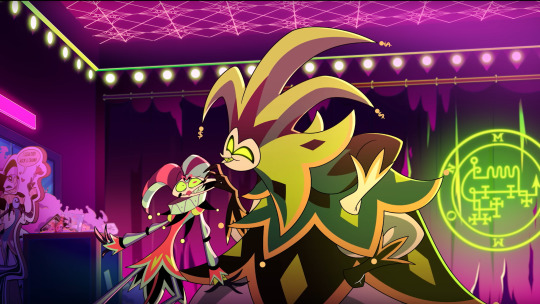
One detail in Mammon’s Musical Special that I found rather interesting upon rewatch is the fact that Fizzarolli doesn’t seem to be subjected to or threatened with direct sexual exploitation or coercion by Mammon.
And I find that pretty curious because we generally kind of expect or otherwise assume that sort of thing in these kinds of stories, right? That this super manipulative, abusive boss who’s exploiting his prized performer also personally lusts after them and is privately coercing them into performing sexual acts. Particularly when we consider the whole ‘Sex Robots’ angle and the fact that we’re seeing/will-see exactly this with Valentino and Angel Dust in Hazbin Hotel.

But with Mammon we just flat out don’t see this whatsoever. He never makes any sort of advances on Fizzarolli or makes any kind of direct comment on his attractiveness, even in their private conversations. In fact, I get the sense that Mammon doesn’t even CARE personally about sexual gratification all that much.
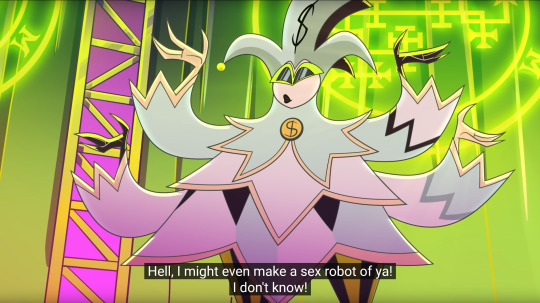

The way he off-handedly brings up the ‘sex-robot’ idea in the flashback really gave me the vibe of “I don’t exactly GET this whole ‘sex’ thing myself, but if people will buy it, awesome!” The way he talks about Fizzarolli’s sex appeal and the robots makes it seem like Mammon views sex purely as a commodity he can profit off of, rather than anything he’s personally interested in.
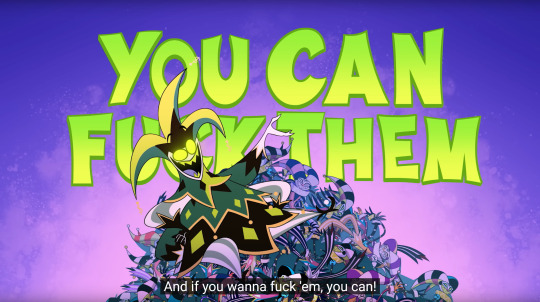

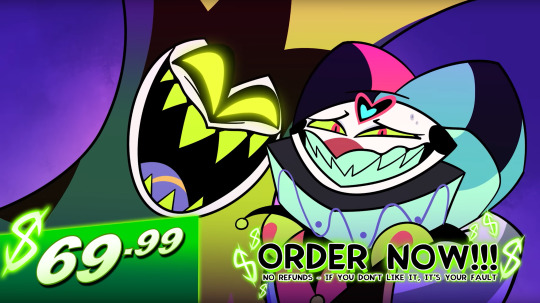
And I find all that pretty interesting because the episode makes clear that Mammon not directly sexually exploiting Fizzarolli DOESN’T make what he’s doing any less creepy, manipulative and abusive. Mammon still comes off as a giant skeevy scumbag because while he may not care about sex personally, it's clear that he’s still happy to cater directly to the ‘sick degenerates’ (as he outright calls them himself) among Fizzarolli’s fans simply because he realized that he could make a LOT of money off them. While being completely uncaring about how uncomfortable Fizzarolli is with this arrangement.

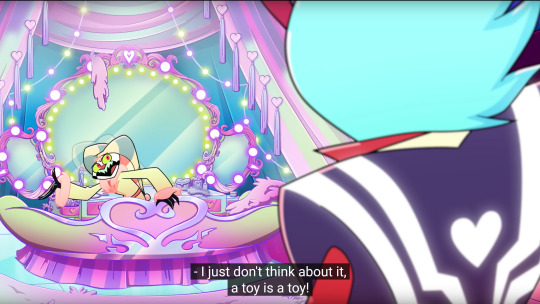
If anything, I think this all may have made it even harder for Fizz to recognize and admit to himself how badly Mammon was treating him. We see in the episode that it seems like the indirectness lets Fizzarolli more easily rationalize away just how uncomfortable it makes him, what with the whole ‘they’re just toys’ comment. It’s not like he’s the one all the creepy obsessive fans are paying to have sex with, it’s just hundreds of robots made specifically to look exactly like him.
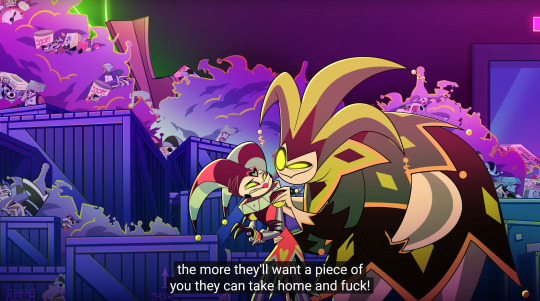

It all conveys the cynical, uncaring, exploitative nature of how Mammon really views Fizzarolli, and of course helps to frame Mammon as a stand-in for any number of exploitative entertainment corporations. The kind of morally bankrupt mentality that might not personally agree with some truly awful people, but will happily cater to them if it will generate profit.
Finally in an amusing twist, it also means that even as bad as Mammon is, he’s somehow still beat in the complete and utter scumbag department by Valentino XD
308 notes
·
View notes
Text
Arthur's Redemption: A Reflection of the Dregs of Idealism
(Warning: Spoilers for RDR2)
Arthur's redemption is the reason why RDR2 is as loved and coveted as it is. It is the reason why it is in the videogame hall of fame and it is the reason why I'll never forgive the game awards for giving GOW 2018 Game of the Year instead of RDR2.
But what I find very interesting is exactly WHERE his redemption is aimed towards, because remember, Arthur never gives up the gang life until the VERY end when he has to confront Micah on being a rat.
One of the first things that the game tries to remind us of is is that Dutch's gang is different. It isn't savage, or heartless, or "as bad" as the other gangs like the O'Driscolls and the Del Lobos. In every single mission that involves robbery, the VDL gang either robs crooks, corporations, robber barons, rich people, slavers, people with fucked up political views, etc. Etc. That is what puts them above other gangs in terms of their reputation, alongside the fact that they, before the Blackwater massacre and before they got so desperate, would give away portions of their proceedings to the poor and destitute.
And the thing is, the VDL gang's philosophy isn't really different from what you see today, especially here on Tumblr. Kill the rich, eat the rich, tax the rich, etc. Etc. Only real difference, honestly, is that the VDL gang carries out those philosophies violently when we don't.
Does intense violence continue to make philosophies and beliefs just? That's ultimately up to you, I don't want to get into that discussion, but this is very important to take note of because Arthur's redemption isn't realizing the gang life and violence is bad, but by going back to the original thought processes and beliefs that guided the VDL gang. He goes from apathetic to passionate.
Notice the "redemption" missions of chapter 6. You forgive debts and kick out Strauss because he represents all the evils of money lending and usuery. Arthur begs Edith Downes to allow her to let him help her, but he doesn't want her forgiveness as he knows he doesn't deserve it. He teaches a grieving woman how to hunt and survive in the wilderness. He befriends a veteran and connects with the great American wilderness. He gives people his blessing to get out of the gang and ultimately sacrifices his final moments to get John, Abigail, and Jack to safety.
Arthur focuses on people and their personal lives. He focuses on their struggles, their dreams, their hopes, their stories, and just all the things that make them human.
Let's look at the debt missions in chapter six. There are three of them. Mrs. Londonderry, J. John Weathers, and Edith Downes. Arthur either comes to face with how morally bankrupt the business of usury is, which then relates back to the more political side of the VDL gang, which is the resistance of the predatory upper class, or he tries to mend the wrongs of being in that system without the expectation of forgiveness.
Those debt missions, though side missions, are super important to Arthur's redemption.
Other than the debt missions, there is also the more personal aspects of missions. Some missions are completely personal, like the Charlotte missions or the Hamish missions, while others are slid in such as Arthur lecturing John after blowing up the bridge.
Arthur cares about the people, the everyday people, and he loses his apathy that makes him violent and mean, which is where his redemption lies.
But the gang life? He doesn't quit that. He doesn't have any qualms, morally, about blowing up bridges, fighting against the government, the army, and anyone who may support the organizations that Dutch taught him to hate from such a young age. There is no guilt there. Arthur only has guilt towards hurting those the gang was originally there to help.
His redemption isn't him realizing what he is doing is wrong, and that the gang life is wrong. His redemption is him going back to the original ideals that Dutch taught him.
I just think that's really interesting. It also opens up a discussion on the philosophical nature of the blurred line between violence and Idealism, and whether or not someone can still be good whilst being on that line.
In any case, yapyapyapyapyap
#rdr2#red dead redemption 2#arthur morgan#dutch van der linde#john marston#character analysis#story analysis
96 notes
·
View notes
Text

breaking: area man cant stop making dudes
Meant to do some halloween themed adopts and then immediately got ideas for this lycan fella. Reigning champ of a shifter fighting rink. I think he's probably morally bankrupt but in sort of a "i'm just here to party hard" way
Stupid doodles are mostly there to amuse myself. Don't consider them canon. For now...
Anywho. I can't stop imagining him with a scary lady boss/manager type person who arranges his fights so I may have to make her as well soon...
SORRY I KEEP MAKING GUYS WHO I DONT HAVE SOLID PLANS FOR YET, I AM REFILLING MY TUOY BOX <3
#A LOT OF MY GUYS ARE LIKE#DIVIED UP NOW#i need more guys with vague concepts i can tuck away and take out later#because ive all but run out of guys that can go anywhere!!!!!#well. not so much anymore. cause ive BEEN refilling my toybox#but yknow#my art#jacova art#once i have them all in my toyhouse select ill feel better about having so many new additions lol#i also wanna make some public notes on some of my factions/worldbuilding soon
54 notes
·
View notes
Text
Nothing like watching Arcane to remind me just how quickly I will become morally bankrupt when presented with the right kind of character/dynamic. Because the thing is, Jinx and Silco are not the heroes of this story, they are presented as the villains. At every turn they hurt those around them. They may be motivated to a degree by the wrongs that have been done to them and the oppression put on them by the powerful, but their intentions are far from pure. They’re mean. They’re ruthless. They’re killers. The story makes it clear we should be rooting for characters like Vi, Ekko, Caitlyn, and Vander. But…there is just something so special to me in their characters, something so poetic and poignant. And maybe that’s the point of our villains: the poetry, the irony. Our villains were created by misdeeds of our heroes. And not just innocent, accidental deeds mind you, they were created by anger and the violence and ruthlessness. Our villains are the victims of our heroes. And while that may not truly justify all the bad they’ve done in a strictly moral sense, I just find it hard not to root for them: the victims, the utterly damaged beyond repair, the ones who were not gifted with physical strength but with intelligence and cunning. The ones nobody believed in. And it boils down to the dynamic too. Jinx and Silco. Silco is objectively a terrible person: he’s our villain, after all. But there is something so unconditional in his love for Jinx. An inhuman sort of patience, that not even our good guys possess. Silco loved Jinx and understood her and forgave her and chose her in a way our heroes never did. And that’s why it’s impossible to truly see these characters as complete monsters. Because what’s more human than love and brokenness?
217 notes
·
View notes